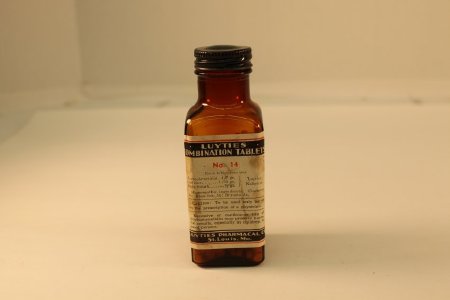Object ID Number:
PH198
Object Name:
Medicine Bottle
Type:
Combination Tablets
Manufactured from:
1890
Manufactured to:
1920
Description / History:
Small mouth–blown glass bottle containing homeopathic grey tablets. White label reads, "Luyties Combination Tablets No. 14".
Dr. Herman Luyties studied under homeopathic doctors in Germany before coming to America to open a small homeopathic pharmacy in St. Louis. From 1853 on he expanded his buisness until it became one of the largest and most highly regarded homeopathic pharmacies in the world. Recieving the 1904 World Fair's Grand Prize of Medicine was just one on his long list of achievements.
Combination Tablets, such as this one, were made for specific illnesses such as "Whooping Cough" and "Headache". The thought is that he prescribed these tablets for his traveling patients he could not see himself.
This specific bottle is slightly different from the rest, as it possibly exempifies the changes in medical safety practices. While other Luyties bottle lables simply list the ingredients in the tablets, this particular bottle lists ingredients as well as two caution notes. It reads, "Caution: To be used only by or on the prescription of a physician" and "Excessive or continuous use of Acetophenetidin may produce harmful results, especially in children or aged persons". Caution labels such as this have not been seen on earlier Luyties combination tablet bottles, despite the presence of toxic ingredients. Based on the ingredients in this bottle, it can be assumed this medication was used to treat mild pains, mild stomach problems and/or flu–like symptoms.
Ingredients in this bottle include:
Acetophenetidin: used to treat mild aches and pains, as well as the common flu. In small doses, acetophenetidin is very affective and safe. Doses larger than 10mg per day (in a patient who does not ingest alcohol), can result in liver failure and death with a few days.
Caffeine: While it is most often used to increase mental alertness, caffeine can also be used to treat headaches.
Sodium bicarbonate: reduces stomach acid. Is most commonly used as an antacid used to treat heartburn and indigestion.
Cinchona: Is most commonly used to increase appetite, thus promoting the release of digestive juices. This release can be used for stomach issues such as bloating and fullness.
Rhus tox: More commonly known as "Poison Ivy", this substance is mainly used to treat back pain, arthritis, and other aches and pains. I can also be used to treat flu–like symptoms.
Bryonia: Mainly used as an emetic and laxative. Can be used to treat stomach disorders, arthritis, liver disease and metobolic diseases.
Dr. Herman Luyties studied under homeopathic doctors in Germany before coming to America to open a small homeopathic pharmacy in St. Louis. From 1853 on he expanded his buisness until it became one of the largest and most highly regarded homeopathic pharmacies in the world. Recieving the 1904 World Fair's Grand Prize of Medicine was just one on his long list of achievements.
Combination Tablets, such as this one, were made for specific illnesses such as "Whooping Cough" and "Headache". The thought is that he prescribed these tablets for his traveling patients he could not see himself.
This specific bottle is slightly different from the rest, as it possibly exempifies the changes in medical safety practices. While other Luyties bottle lables simply list the ingredients in the tablets, this particular bottle lists ingredients as well as two caution notes. It reads, "Caution: To be used only by or on the prescription of a physician" and "Excessive or continuous use of Acetophenetidin may produce harmful results, especially in children or aged persons". Caution labels such as this have not been seen on earlier Luyties combination tablet bottles, despite the presence of toxic ingredients. Based on the ingredients in this bottle, it can be assumed this medication was used to treat mild pains, mild stomach problems and/or flu–like symptoms.
Ingredients in this bottle include:
Acetophenetidin: used to treat mild aches and pains, as well as the common flu. In small doses, acetophenetidin is very affective and safe. Doses larger than 10mg per day (in a patient who does not ingest alcohol), can result in liver failure and death with a few days.
Caffeine: While it is most often used to increase mental alertness, caffeine can also be used to treat headaches.
Sodium bicarbonate: reduces stomach acid. Is most commonly used as an antacid used to treat heartburn and indigestion.
Cinchona: Is most commonly used to increase appetite, thus promoting the release of digestive juices. This release can be used for stomach issues such as bloating and fullness.
Rhus tox: More commonly known as "Poison Ivy", this substance is mainly used to treat back pain, arthritis, and other aches and pains. I can also be used to treat flu–like symptoms.
Bryonia: Mainly used as an emetic and laxative. Can be used to treat stomach disorders, arthritis, liver disease and metobolic diseases.
